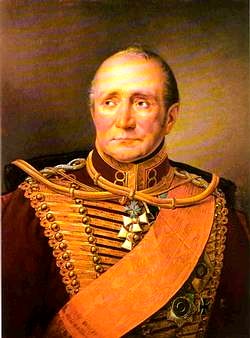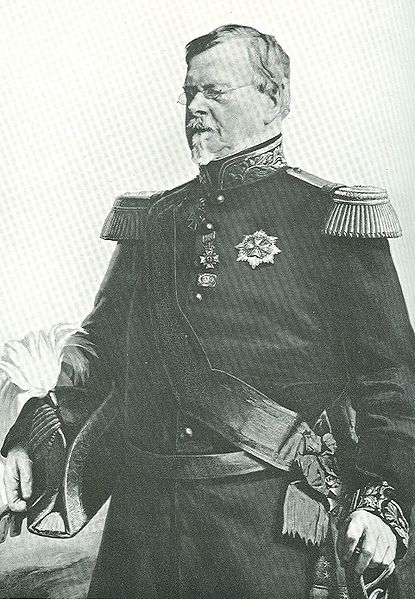<Back to Index>
- Commander of I Corps Lieutenant General Hans Ernst Karl, Graf von Zieten, 1770
- Commander of III Corps Lieutenant General Johann Adolf Freiherr von Thielmann, 1765
- Commander of 2nd Brigade Carl Bernhard of Saxe - Weimar - Eisenach, 1792
PAGE SPONSOR

Hans Ernst Karl, Graf von Zieten (5 March 1770 – 3 May 1848) was an officer in the Prussian Army during the Napoleonic Wars.
Zieten was born in Dechtow in the Margraviate of Brandenburg; he was not related to the Frederician general Hans Joachim von Zieten.
During the Waterloo Campaign of 1815, Lieutenant General von Zieten commanded the Prussian I Corps. The corps fought a holding action against the French on 15 June, and was heavily engaged against the French the next day at the Battle of Ligny, and then again two days later on June 18 at the Battle of Waterloo.
On 1 June, Zieten's I Corps participated in the Battle of Issy just outside the walls of Paris. At the end of the campaign on 7 June, his corps was granted the honor of being the first major Coalition force to enter Paris.
King Frederick William III of Prussia granted Zieten the title of Graf, or count, on 3 September 1817. At the age of 69, he was promoted to Generalfeldmarschall on 9 September 1839. Zieten died in Warmbrunn.


Johann Adolf Freiherr von Thielmann (27 April 1765 Dresden – 10 October 1824 Coblenz) was a Saxon soldier who served with Saxony, Prussia and France during the Napoleonic Wars.
Entering the Saxon cavalry in 1782, he saw service against the French in the Rhine campaigns and served on the side of Prussia in the Jena campaign. After the disaster of Jena, Thielmann was sent by Saxony as ambassador to Napoleon I, became his ardent admirer, and did much to bring about the Franco - Saxon alliance. Thielmann accompanied the Saxon contingent which fought at the siege of Danzig and at Friedland.
In 1809, as colonel of Freikorps, he opposed the advance of the Austrians into Saxony, and was rewarded for his services with the grade of major general, further promotion to lieutenant general following in 1810. As commander of the Saxon Heavy Cavalry Brigade he took part in the advance on Moscow two years later, and his exceptional bravery at Borodino attracted the attention of Napoleon, who took Thielmann into his own suite. His own sovereign at the same time made him Freiherr.
In the war of the Sixth Coalition, Thielmann, now von Thielmann, took a prominent part. As governor of Torgau,
by his king's orders he at first observed the strictest neutrality, but
on receipt of an order to hand over the fortress to the French he
resigned his command and, accompanied by his staff officer Aster, joined
the allies. As a Russian general he was employed in reorganizing the
Saxon army after Leipzig, and in 1814 he commanded the Saxon corps operating in the Low Countries.
Early in the following year he became a lieutenant general in the Prussian service, and in command of the 3rd army corps he took part in the Waterloo campaign. From the field of Ligny he retired with the rest of Blücher's army on Wavre, and when the other corps marched towards Waterloo, von Thielmann defended this movement against Grouchy, fighting in the Battle of Wavre (18–19 June 1815), thus contributing materially to the victory at Waterloo.
Later in life, he was a corps commander at Münster and at Coblenz, and at the latter place he died as a general of cavalry.

Prince Carl Bernhard of Saxe - Weimar - Eisenach (30 May 1792 – 21 July 1862) was a distinguished soldier, who, in 1815, after the congress of Vienna, became colonel of a regiment in the service of the king of the Netherlands. He fought at the Battle of Quatre Bras and the Battle of Waterloo where he commanded the 2nd Brigade of the 2nd Dutch Division.
Prince Bernhard, the seventh child of Charles Augustus, Grand Duke of Saxe - Weimar - Eisenach, was born on 30 May 1792 in Weimar. He enlisted in the Prussian army and in 1806 he fought in the army of Hohenlohe - Ingelfingen. By 1809 he had enlisted in the Saxon army and he fought under Marshal Bernadotte at Wagram.
Prince Bernhard's 2nd Brigade of the 2nd Dutch Division (Sedlnitsky) was the first of the Duke of Wellington's forces to arrive at the cross roads of Quatre Bras. Prince Bernhard's brigade (joined later by the 1st Brigade,) held the cross roads at Quatre Bras for almost 24 hours from the late afternoon of 15 June 1815, until about 3 p.m. on the 16 June, preventing Marshal Michel Ney with the left wing of the French L'Armée du Nord from taking the cross roads before the Duke of Wellington and substantial allied forces arrived to reinforce the 2nd Division and fight the Battle of Quatre Bras. The successful holding action by the two brigades of the Dutch 2nd Division was one of the most important actions by any of the coalition brigades in the whole of the Waterloo Campaign.
At the Battle of Waterloo Prince Bernhard commanded the allied forces holding the farms of Papelotte, Frichermont and La Haie on the extreme left of the Duke of Wellington's line of battle.
They were strategically important, not just because if the forces
holding these positions gave way then the French could out flank
Wellington, but because it was from that direction that Wellington
expected and received Prussian support. Though in the course of the
battle Durutte’s 4th French Division obtained a temporary foothold in
Papelotte, it was never captured.
Prince Bernhard traveled extensively in the United States in 1825 - 26. He published an account of his travels, Reise sr. Hoheit des Herzogs Bernhard zu Sachsen - Weimar - Eisenach durch Nord - Amerika, in 1828. The work was translated into English and published in Philadelphia, also in 1828, as Travels through North America, during the Years 1825 and 1826.
In the years after Waterloo, Bernhard distinguished himself as commander of a Dutch Division in the Belgian campaign of 1831 (the Ten Days Campaign), and from 1847 to 1850 held the command of the forces in the Dutch East Indies. He died 21 July 1862 in Liebenstein.
He married Ida of Saxe - Meiningen, daughter of Georg I, Duke of Saxe - Meiningen, on 30 May 1816 in Meiningen. Prince Bernhard's son, William Augustus Edward, known as Prince Edward of Saxe - Weimar (b. 1823 - d. 1902), entered the British army, served with much distinction in the Crimean War, became colonel of the 1st Life Guards, and later a British Field Marshal.
His daughter Amalia married Prince Henry of the Netherlands.
His granddaughter Pauline of Saxe - Weimar - Eisenach (through his son Herman) married Charles Augustus, Hereditary Grand Duke of Saxe - Weimar - Eisenach.